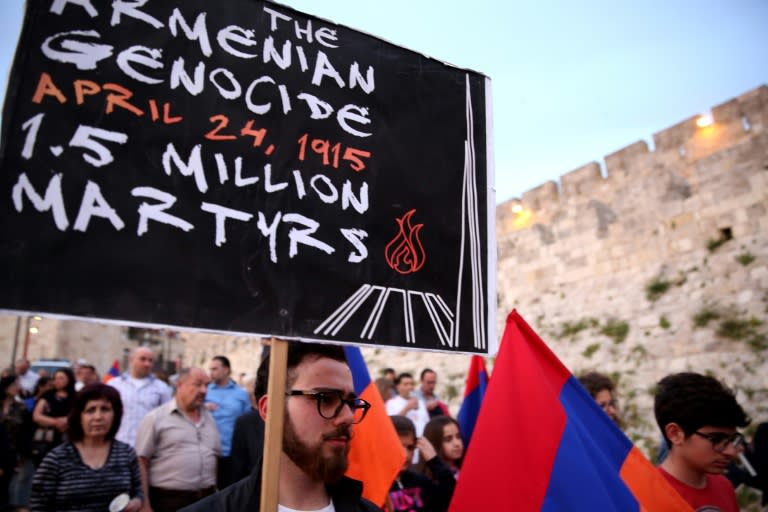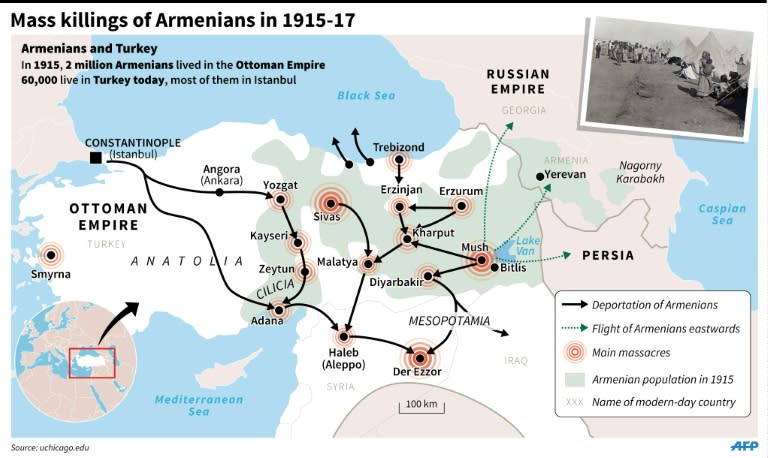Germany risks Turkey wrath with Armenian genocide vote
Germany's parliament votes Thursday on a resolution that brands the massacre of Armenians by Ottoman forces as genocide, drawing a clear warning from Turkey's president that it would harm ties. Put forward by the ruling left-right coalition and the opposition Greens, the resolution entitled "Remembrance and commemoration of the genocide of Armenians and other Christian minorities in 1915 and 1916" also carries the contested word throughout the text. The vote comes just over a year after President Joachim Gauck became Germany's highest ranking official to describe the massacre as a "genocide", sparking a fierce response from Turkey. Its timing is also awkward, as Germany and the European Union need Ankara to help stem a migrant influx even as tensions are rising between both sides over a string of issues, including human rights. In a strong call against the Bundestag move, Turkish President Recep Tayyip Erdogan said: "If (Germany) falls into such a game, that would harm our future ties -- the diplomatic, economic, political, commercial and military ties between the two countries." "I believe all of these would be reconsidered," he told reporters in the western province of Izmir, adding that he had also telephoned Chancellor Angela Merkel over the wording of the text. Merkel's Christian Democrats were instrumental in putting the resolution forward, and she herself could, as an elected MP, cast a vote. - 'Partial responsibility' - Turkey and Armenia have long been at loggerheads over the World War I-era massacre. Armenians say up to 1.5 million of their kin were killed between 1915 and 1917 as the Ottoman Empire was falling apart and have sought to win international recognition of the massacres as genocide. "It's about rendering historical justice, it's an obligation of the entire international community towards the memory of the victims of the genocide," Armenian foreign ministry spokesman, Tigran Balayan, told AFP. He added that recognition is "important for the prevention of genocides in future". Modern Turkey, the successor state to the Ottomans, rejects the claim, arguing that 300,000 to 500,000 Armenians and as many Turks died in civil strife when Armenians rose up against their Ottoman rulers and sided with invading Russian troops. More than 20 nations, including France and Russia, have recognised the Armenian genocide, but Germany has not. In direct reference to the atrocities against the Armenians, the resolution says: "Their fate exemplifies the mass exterminations, the ethnic cleansing, the expulsions and indeed the genocides that marked the 20th century in such a terrible way." It also states that the "German Empire bears partial responsibility for the events," a point that Gauck had also made last year. Germany was then allied with the Ottomans, and deployed soldiers who participated in the deportations of Armenians, Gauck had said. - 'Wrong path?' - The issue is particularly sensitive in Germany, as it has special ties with Ankara not least due to its three-million-strong ethnic Turkish population which settled following a massive "guest worker" programme in the 1960s and 1970s. Ahead of the vote, around 1,000 people marched Saturday in a protest organised by Turkish groups, which also sent letters to lawmakers to campaign against the vote. Kurds in Germany launched a counter-campaign, flooding Bundestag lawmakers with emails urging them to withstand Turkish pressure. Yet the vote is also controversial within party lines. Foreign Minister Frank-Walter Steinmeier, who a year ago rejected Gauck's use of the word "genocide", said Tuesday he hoped the Bundestag vote would not derail efforts to reconcile Turkey and Armenia. The German government's top official in charge of integration, Aydan Oezoguz, warned that it is the "wrong path" to take. "Those who think that such a move would lead automatically to a rehabilitation in Turkey are wrong. Through this vote, that aim would be pushed further away." Nevertheless, party leaders shrugged off any potential impact on relations with Turkey. The aim is "not to put Turkey in the dock," Franz Josef Jung, who is the deputy chief of the Christian Democrats group in parliament, told Frankfurter Allgemeine Zeitung daily. "We are not asking the Turkish government to admit its guilt in the genocide, but for it to recognise its historical responsibility."

 Yahoo Finance
Yahoo Finance 


